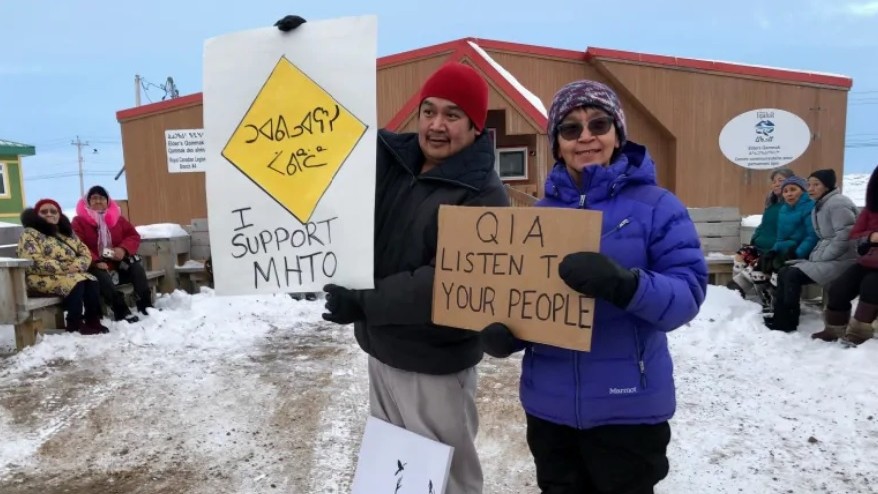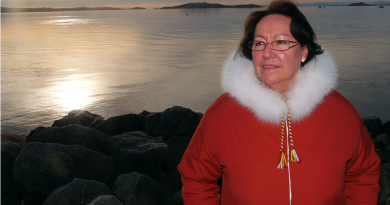‘What is happening now is not working for Inuit’: Why Inuit association in Arctic Canada won’t support Baffinland mine expansion

QIA board voted in March not to support expansion
The Qikiqtani Inuit Association says its decision to not support Baffinland’s Phase 2 expansion came down to a lack of trust among communities, and uncertainty about whether new proposed mitigation measures will actually work with a larger mining operation.
Baffinland is requesting to double its shipping of iron ore from its Milne Inlet port to 12 million tonnes a year, and build a 110-kilometre railway to the port. Public hearings on the proposal resumed this week in Iqaluit.
On Tuesday, Mittimatalik Hunters and Trappers Organization chairperson Eric Ootoova asked the Qikiqtani Inuit Association what led to its decision last month to not support the project expansion.
“The communities have been saying this proposal is too fast, too soon,” replied Jared Ottenhof, QIA’s director of lands and resource management.
“Inuit are only now seeing impacts of the current project operating nearly six million tonnes per year. Existing impacts are not even fully understood.”
Ottenhof pointed to discrepancies between what Inuit are observing about current impacts to caribou and Baffinland’s own monitoring, and to the concerns over dust around the mine and the Milne Inlet port.
Decision made after feedback
Another reason why QIA’s board wouldn’t support the project is because of the feedback the organization received from communities about the Inuit Certainty Agreement QIA signed with Baffinland last June.
Ottenhof said the agreement was supposed to address “key deficiencies” in the way the mine is currently operating.
Among them was how “Inuit qaujimajatuqangit (Inuit traditional knowledge) was not applied properly.”
“Culture, resource and lands use studies were not adequate. [And] the socioeconomic benefits for those who are most impacted have been overstated,” he said.
More needed to make sure community trusts measures
The new deal proposes a series of new environmental protection measures, of which many are contingent on the Phase 2 expansion going ahead. But Ottenhof said more work needs to happen to ensure communities trust the measures being proposed, before Baffinland ramps up production.
“The Inuit Certainty Agreement proposes solutions. But QIA was clear, and the Inuit Certainty Agreement is clear, that those solutions must be accepted by the impacted communities,” Ottenhof said.
“QIA respects the impacted communities’ position that they have did not have confidence that the Inuit Certainty Agreement models will work or go far enough, because there is little trust based on the history of the Mary River Project so far.”
“QIA still believes that the types of solutions proposed in the Inuit Certainty Agreement are relevant to both the existing operations of the mine, and any expansion,” Ottenhof continued. “But trust is needed in order to further develop them and they need to be tested to ensure they work for the existing project before rolling out a significant expansion.”
‘We need to get it right’
Ottenhof said, ideally, Baffinland would implement parts of the agreement to prove they work over several years, before expanding operations.
“We need to get it right before accelerating to a pace of production and shipping to an overall rate … eight times more than the rate already creating serious concerns for Inuit,” Ottenhof said.
“What is happening now is not working for Inuit.”
Later in the day, Ottenhof’s remarks were echoed by Ootoova — the Mittimatalik HTO chair — who in his own response to why his organization doesn’t support the proposal said the HTO has “little or no trust Baffinland will what they say they will do.”
“[Baffinland has] had many years to prove themselves, but they have failed to meet a number of present project commitments,” Ootoova said, adding Baffinland’s expansion is asking for too much, too fast.
Baffinland promising new commitments
Baffinland representatives were not able to respond directly to Ottenhof’s remarks given the question-and-answer format of the NIRB hearings. But in a statement to CBC News, Baffinland highlighted new commitments that it says go “above and beyond what has already been proposed in the Inuit Certainty Agreement and through the ongoing NIRB review process.”
Those include increased environmental protection by way of more dust-monitoring stations, and expanding caribou and char-monitoring programs with “greater Inuit involvement.”
The company has also committed to gradually increasing shipping over four years from when Phase 2 is approved, and banning the use of heavy fuel oil seven years before it’s to be outlawed in Canada’s Arctic.
Related stories from around the North:
Canada: Wildlife concerns still lingering in Arctic Canada as public hearings into Baffinland’s expansion resume, CBC News
Finland: Miners hunting for metals to battery cars threaten Finland’s Sámi reindeer herders’ homeland, Yle News
Greenland: Political upheaval in Greenland — What does Inuit Ataqatigiit do now?, Eye on the Arctic
Norway: The Arctic Railway – Building a future or destroying a culture?, Eye on the Arctic
Russia: Can the environment withstand Arctic Russia’s coal mining boom?, The Independent Barents Observer
Sweden: Reducing emissions could create up to 3,000 new jobs in Arctic Sweden says mining group, Radio Sweden
United States: Conservation groups sue government over Alaska mining road, The Associated Press



